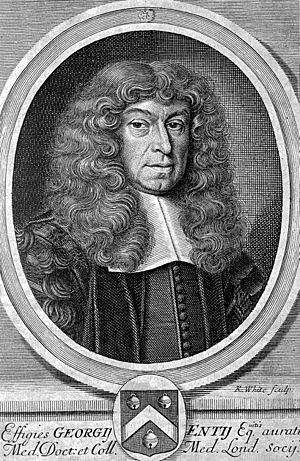George Ent facts for kids
Quick facts for kids
Sir George Ent
|
|
|---|---|
 |
|
| Born | 6 November 1604 |
| Died | 13 October 1689 (aged 84) |
| Education | Sidney Sussex College, Cambridge, University of Padua |
George Ent (born November 6, 1604 – died October 13, 1689) was an important English scientist in the 1600s. He was a doctor, a writer, and a great friend of William Harvey, who discovered how blood circulates in the body. Ent helped defend Harvey's ideas and was even knighted by King Charles II!
Contents
A Life of Learning and Discovery
Early Life and Education
George Ent was born on November 6, 1604, in Sandwich, Kent, England. His family had moved there from Flanders to avoid religious problems. As a boy, George went to school in Wallachia and Rotterdam. Later, he came back to England for college.
In 1624, he started at Sidney Sussex College, Cambridge. He earned his first degree in 1627 and his master's degree four years later. After Cambridge, he spent five years studying at the University of Padua in Italy. There, he earned his medical degree (MD) in 1636.
A Respected Doctor
On June 25, 1639, George Ent became a fellow of the Royal College of Physicians. He stayed a fellow for his entire life. He held many important roles there, including Registrar and Consiliarius. In 1670, he was chosen to be the President of the Royal College of Physicians. He held this top position for five years.
Ent was also elected as an original member of the Royal Society in 1663. This was a very famous group of scientists.
In 1646, George Ent married Sarah. Her father, Dr. Othowell Meverell, had also been a president of the Royal College.
Author and Anatomist
George Ent was known for being a great writer and scholar. He was especially good at speaking and writing in Latin. He wrote several books, and his first one, Apologia, was very important.
He also studied and gave lectures on anatomy, which is the study of the body's structure. In 1665, King Charles II watched one of his anatomy lectures at the Royal College of Physicians. The King was so impressed that he knighted George Ent right there! This was the only time someone was knighted inside the Royal College.
Friend of William Harvey
Even though he was 26 years younger, Ent was a close friend of William Harvey. Harvey is famous for discovering how blood circulates in the body. Ent met Harvey in Venice after finishing his studies in Padua.
Ent's book, Apologia, was a strong defense of Harvey's theory about blood circulation. Ent also helped convince Harvey to publish another important book, de Generatione Animalium, which Ent himself edited.
Interest in Fossils
Ent was also known for his letters with Cassiano dal Pozzo. Dal Pozzo sent Ent fossilized wood, including a tabletop made of petrified wood. Ent showed these to the Royal Society, and they made people more interested in how fossils are formed.
George Ent passed away at his home in St Giles-in-the-Fields on October 13, 1689. He was 84 years old.
Important Works and Ideas
George Ent's main importance comes from how he helped others' work, especially through his thoughtful reviews. He was one of the closest friends and first supporters of William Harvey. Ent is also seen as one of the scientists who continued Harvey's work in anatomy.
Apologia pro circulatione sanguinis
This title means Defense on Behalf of the Circulation of the Blood.
Written in 1641, the Apologia pro circulatione sanguinis is Ent's most important work on anatomy. In this book, he defended the ideas from William Harvey’s famous book, de Motu Cordis (On the Circulation of the Blood). Ent directly answered critics like Emilius Parisianus. This book was important because it showed Ent's own ideas about anatomy and was one of the first detailed defenses of Harvey’s work.
In the Apologia, Ent added to Harvey’s ideas about circulation. He suggested that a "nutritive fluid" travels through the nerves to feed the body.
Lectures on Anatomy
Ent gave several lectures on anatomy at the Royal College of Physicians in 1665. He is known for being one of only two lecturers who wrote down his notes in English. After one lecture in April, which the King attended, Ent received a knighthood.
Images for kids
 | Tommie Smith |
 | Simone Manuel |
 | Shani Davis |
 | Simone Biles |
 | Alice Coachman |


